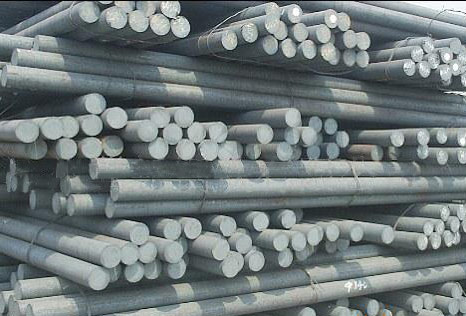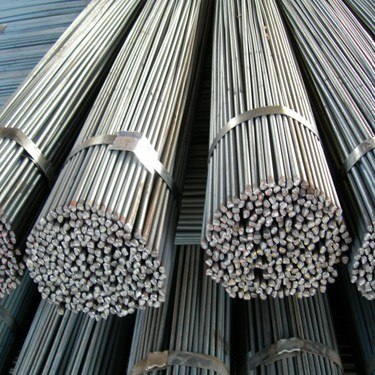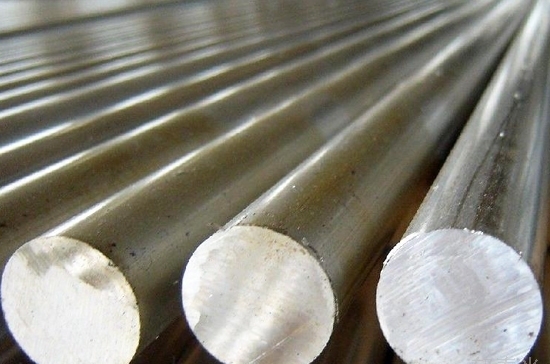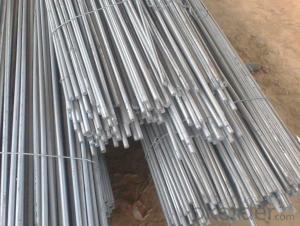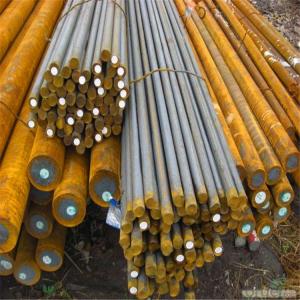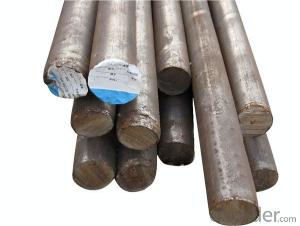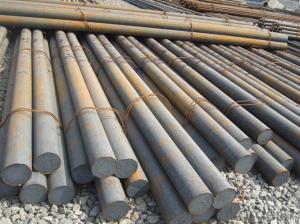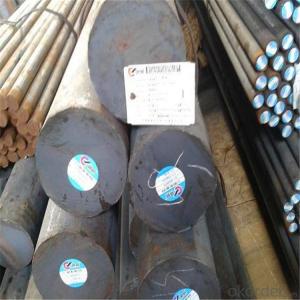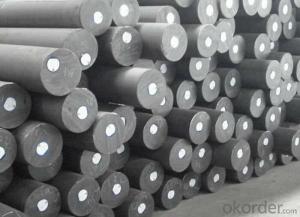Hot Rolled Steel Round Bar 20CrMnTi
- Loading Port:
- China Main Port
- Payment Terms:
- TT or LC
- Min Order Qty:
- -
- Supply Capability:
- -
OKorder Service Pledge
OKorder Financial Service
You Might Also Like
Product Description:
OKorder is offering high quality Hot Rolled Steel Round Bar 20CrMnTi at great prices with worldwide shipping. Our supplier is a world-class manufacturer of steel, with our products utilized the world over. OKorder annually supplies products to European, North American and Asian markets. We provide quotations within 24 hours of receiving an inquiry and guarantee competitive prices.
Product Applications:
Hot Rolled Steel Round Bar 20CrMnTi are ideal for the production of spring, bearing, and automobile parts
Product Advantages:
OKorder's Hot Rolled Steel Round Bars 20CrMnTi are durable, strong, and with competitive price
Main Product Features:
· Premium quality
· Prompt delivery & seaworthy packing (30 days after receiving deposit)
· Corrosion resistance
· Can be recycled and reused
· Mill test certification
· Professional Service
· Competitive pricing
Product Specifications:
Manufacture: Hot rolled
Certificates: ISO, SGS, BV, CIQ
Length: 6m – 12m, as per customer request
Packaging: Export packing, nude packing, bundled
Diameter | Mass | Diameter | Mass | Diameter | Mass |
(mm) | (kg/m) | (mm) | (kg/m) | (mm) | (kg/m) |
6 | 0.22 | 22 | 2.98 | 53 | 17.30 |
7 | 0.30 | 24 | 3.55 | 56 | 19.30 |
8 | 0.40 | 25 | 3.85 | 60 | 22.20 |
9 | 0.50 | 26 | 4.17 | 63 | 24.50 |
10 | 0.62 | 28 | 4.83 | 65 | 26.00 |
11 | 0.75 | 30 | 5.55 | 70 | 30.20 |
12 | 0.89 | 32 | 6.31 | 75 | 34.70 |
13 | 1.04 | 34 | 7.13 | 80 | 39.50 |
14 | 1.21 | 36 | 7.99 | 85 | 44.50 |
15 | 1.39 | 38 | 8.90 | 90 | 49.90 |
16 | 1.58 | 40 | 9.86 | 95 | 55.60 |
17 | 1.78 | 42 | 10.90 | 100 | 61.70 |
18 | 2.00 | 45 | 12.50 | 120 | 88.85 |
19 | 2.23 | 48 | 14.20 | 140 | 120.93 |
20 | 2.47 | 50 | 15.40 | 150 | 138.82 |
FAQ:
Q1: Why buy Materials & Equipment from OKorder.com?
A1: All products offered byOKorder.com are carefully selected from China's most reliable manufacturing enterprises. Through its ISO certifications, OKorder.com adheres to the highest standards and a commitment to supply chain safety and customer satisfaction.
Q2: How do we guarantee the quality of our products?
A2: We have established an advanced quality management system which conducts strict quality tests at every step, from raw materials to the final product. At the same time, we provide extensive follow-up service assurances as required.
Q3: How soon can we receive the product after purchase?
A3: Within three days of placing an order, we will begin production. The specific shipping date is dependent upon international and government factors, but is typically 7 to 10 workdays.
Q4:What is the package
A4: Standard seaworthy packing or as customer required; all goods are packed in bundle with steel strips and shipped by break bulk vessel or container
Images:
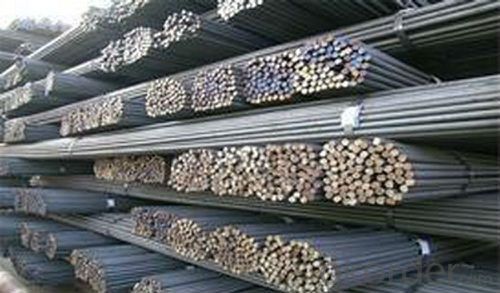
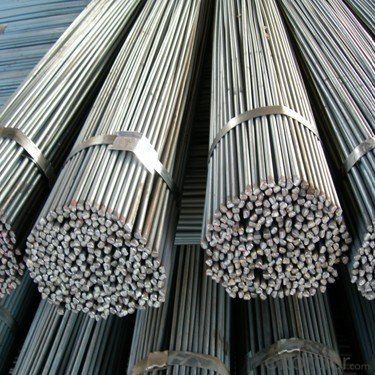
- Q: Why is a steel rope made of many wires rather than a round bar of steel?
- The multi ply, in order to increase the cross-sectional area increases the tension will not suddenly broken, fine wire bend more easily, so the bending of wick core can be better, with better lubrication of steel wire rope. If it is a steel bar, it is not easy to bend, it is easy to break suddenly, and the practicability is poor.
- Q: How are steel round bars used in the manufacturing of conveyor systems?
- Steel round bars are commonly used in the manufacturing of conveyor systems as they provide the necessary strength and durability for supporting heavy loads, guiding conveyor belts, and maintaining stability. These bars are often used as support beams, rollers, and shafts within the conveyor system, ensuring efficient movement of materials along the production line.
- Q: What are the advantages of using silicon-alloy steel round bars?
- Silicon-alloy steel round bars offer several benefits that make them a favorable choice. Firstly, their strength and durability are exceptional, making them suitable for heavy-duty applications. Their high tensile strength allows them to withstand heavy loads and resist deformation, ensuring reliability for mechanical and structural purposes. Secondly, these round bars exhibit excellent heat resistance. The presence of silicon in the alloy enhances their ability to handle high temperatures without compromising their structural integrity. This makes them ideal for applications that involve exposure to extreme heat, such as furnace components, exhaust systems, or high-temperature equipment. Furthermore, silicon-alloy steel round bars provide remarkable corrosion resistance. The inclusion of alloying elements like chromium and nickel creates a protective oxide layer on the surface, preventing corrosion and extending their lifespan. This makes them suitable for use in corrosive atmospheres and marine environments. Additionally, these round bars offer good machinability and weldability. Their ease of forming into various shapes and sizes makes them versatile for different manufacturing processes. Moreover, their weldability allows for easy fabrication and customization, making them convenient for numerous industries. Lastly, silicon-alloy steel round bars are cost-effective. In comparison to other high-performance alloys, they are relatively more affordable, making them a cost-effective option for applications that require strength, durability, heat resistance, and corrosion resistance. In conclusion, the advantages of silicon-alloy steel round bars encompass their excellent strength and durability, good heat resistance, corrosion resistance, machinability, weldability, and cost-effectiveness. These attributes establish silicon-alloy steel as a versatile and reliable material for various industrial applications.
- Q: How do you straighten a bent steel round bar?
- To straighten a bent steel round bar, you can follow a few simple steps: 1. Assess the bend: Determine the severity and location of the bend in the round bar. This will help you decide which method to use for straightening. 2. Heat the bar: If the bend is not too severe, you can heat the bar using a blowtorch or a forge. Apply heat evenly across the bent area until it becomes red hot. Heating the bar will make it more malleable and easier to straighten. 3. Apply pressure: Once the bar is heated, you can use a vice or a hydraulic press to apply pressure on the bent section. Gradually increase the pressure until the bar starts to straighten. Be careful not to apply excessive force as it may cause the bar to break. 4. Use leverage: If the bend is not too severe, you can also use leverage to straighten the bar. Secure one end of the bar in a vice or clamp and apply force to the bent section in the opposite direction. Slowly and gently increase the force until the bar straightens. 5. Cold bending: If the bend is minor, you may be able to straighten the bar without applying heat. This method involves using a hammer or mallet to gently tap the bent area in the opposite direction until it straightens. Be cautious not to strike the bar too hard, as it may create new bends or fractures. 6. Check for straightness: After applying the straightening method, carefully inspect the bar to ensure it is straight. If there are any remaining bends, repeat the process until the bar is completely straight. Remember to wear appropriate safety gear, such as gloves and eye protection, when working with steel bars. It is also advisable to consult a professional if you are unsure about the straightening process or if the bar is severely bent.
- Q: What are the different types of steel round bar surface coatings?
- Some of the different types of steel round bar surface coatings include galvanized coatings, epoxy coatings, powder coatings, and chrome plating.
- Q: How are steel round bars priced?
- Several factors typically determine the price of steel round bars. The cost of raw materials, specifically steel billets or ingots used in production, is a key consideration. The price of these materials can fluctuate based on market conditions, including supply and demand dynamics and changes in input costs. The manufacturing process also plays a role in pricing. Transforming raw materials into finished round bars incurs expenses such as energy consumption, labor costs, and equipment maintenance. The complexity of the manufacturing process and the efficiency of production facilities can affect these costs. Market conditions significantly influence steel round bar pricing. Global economic trends, industry demand, and competition among suppliers all impact the market price. Manufacturers may charge a premium when there is high demand, while prices may be lower during periods of oversupply as suppliers compete for customers. The size, grade, and quality of the steel round bars can also affect pricing. Larger diameter bars or specialty grades that require additional processing steps or high-quality raw materials may be priced higher than standard sizes or lower-grade bars. Transportation costs and logistics are additional factors that influence pricing. Shipping distances, freight rates, and any handling fees can increase the overall cost of the product. In conclusion, the pricing of steel round bars is influenced by raw material costs, the manufacturing process, market conditions, the size and grade of the bars, and transportation costs. Understanding these factors helps buyers and sellers negotiate fair prices for steel round bars.
- Q: What are the different cutting methods for steel round bars?
- There are several different cutting methods that can be used for steel round bars, depending on the specific requirements and equipment available. Some of the most common cutting methods include: 1. Sawing: This is one of the most basic and traditional methods of cutting steel round bars. It involves using a saw blade with teeth to cut through the metal. Sawing can be done manually with a hacksaw or powered by using a bandsaw or circular saw. It is a versatile method that can be used for both small-scale and large-scale cutting projects. 2. Shearing: Shearing is another common method of cutting steel round bars. It involves using a shear machine or hydraulic press to apply a high amount of force to cut the metal. This method is often used for cutting thick or heavy-duty steel bars. 3. Abrasive cutting: Abrasive cutting involves the use of an abrasive wheel or disc to grind away the metal and create a cut. This method is commonly used for cutting steel round bars with irregular shapes or for precision cutting projects. It can be done manually with a handheld grinder or using a machine like an abrasive cut-off saw. 4. Flame cutting: Flame cutting, also known as oxy-fuel cutting, uses a combination of oxygen and a fuel gas (such as acetylene or propane) to create a high-temperature flame that melts and cuts through the steel. This method is often used for cutting thick steel bars or for shaping metal. 5. Plasma cutting: Plasma cutting is a more advanced method that uses a plasma torch to cut through the steel. The plasma torch generates a high-velocity jet of ionized gas that melts and removes the metal. This method is commonly used for precision cutting, as it allows for greater control and produces cleaner cuts compared to other methods. It is important to note that the choice of cutting method will depend on factors such as the thickness and hardness of the steel round bar, the desired precision of the cut, and the available equipment and resources. It is recommended to consult with a professional or experienced metalworker to determine the most appropriate cutting method for a specific project.
- Q: What is the difference between a cold finished and a turned steel round bar?
- A cold finished steel round bar is processed through cold drawing or cold rolling processes, resulting in a smoother and more precise surface finish. On the other hand, a turned steel round bar is machined on a lathe, which removes material to achieve the desired dimensions and surface finish. Overall, the difference lies in the manufacturing process and the resulting surface finish of the two types of steel round bars.
- Q: How do steel round bars compare to brass or copper bars?
- When comparing steel round bars to brass or copper bars, several key differences can be observed. Firstly, steel bars are renowned for their superior strength and durability. They possess a high tensile strength and can withstand heavy loads and impacts, making them ideal for applications that require robustness and toughness. Conversely, brass and copper bars are relatively softer and less rigid, making them more suitable for applications that prioritize malleability and electrical conductivity. Another noteworthy distinction lies in their resistance to corrosion. While brass and copper bars are highly regarded for their excellent corrosion resistance, steel bars, particularly carbon steel, are more susceptible to rusting. However, stainless steel round bars exhibit high resistance to corrosion due to the presence of chromium, making them a suitable alternative to brass or copper bars in environments where corrosion is a concern. In terms of cost, steel round bars are generally more economical compared to brass or copper bars. This is mainly due to the greater availability and lower production costs associated with steel. Brass and copper, being non-ferrous metals, are less abundant and require more complex extraction and refining processes, resulting in relatively higher costs. Moreover, steel round bars offer a wide range of mechanical properties, such as different grades and compositions, enabling customization based on specific application requirements. Conversely, brass and copper bars have more limited options in terms of strength and hardness variations. Overall, the choice between steel, brass, or copper round bars depends on the specific application and desired properties. Steel bars are preferred for their strength, durability, and cost-effectiveness, while brass or copper bars are favored for their malleability, electrical conductivity, and corrosion resistance.
- Q: Can steel round bars be plated or coated?
- Yes, steel round bars can be plated or coated. Plating or coating steel round bars can provide additional protection against corrosion, improve aesthetics, and enhance the durability of the bars.
Send your message to us
Hot Rolled Steel Round Bar 20CrMnTi
- Loading Port:
- China Main Port
- Payment Terms:
- TT or LC
- Min Order Qty:
- -
- Supply Capability:
- -
OKorder Service Pledge
OKorder Financial Service
Similar products
Hot products
Hot Searches
Related keywords



